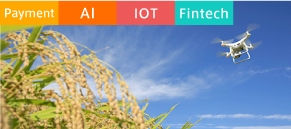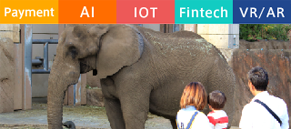- Top
- Column list
- Future Business Warehouse
- Does energy change when shifting to EV?
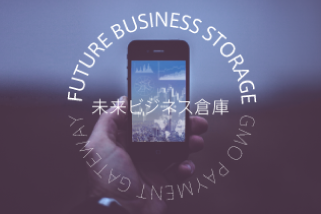
Media that introduces services that provide emotion and convenience to the world that arise from new technology
China, the world's largest automobile market, and the United States, the second largest, are rapidly turning to electric vehicles (EVs). With that in mind, automakers around the world are rushing to develop EVs. The Frankfurt Motor Show in the fall of 2017, in which all the companies appealed EVs and unexpectedly became like an "EV Motor Show". The media described this as an "EV shift." If EVs become widespread with the current momentum, a paradigm shift of 100 years will occur in automobiles that have continued to operate with internal combustion engines. At that time, such a business model may be born.
EV sharing, not just driving
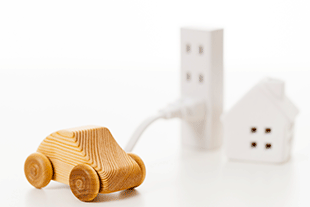
The Watanabe family often goes out by car. I need a car for now because my child is small and I feel sick at night and have to go to the hospital.
However, since I own a hybrid car now, the fuel cost is lower than that of a gasoline car, but parking fee, tax, insurance fee, vehicle inspection fee, repair and maintenance costs are high. At that time, the existence of the Japanese venture "Slow life", which is attracting attention for new businesses using EV, changed Mr. Watanabe's way of thinking about automobiles.
"Slow life", which was launched by four people independent of the energy industry and automobile parts manufacturers, is a business model of the idea of "extracting electricity from EV" born from the ideathon by the four people, and "EV-only carsharing". We arrived at the businesses of "sharing," "sharing energy," and "energy-free." Initially, it was difficult to understand, but it caught the eye of a major Japanese automobile manufacturer, and the situation changed completely when it was decided to collaborate. The momentum to support the disruptor from Japan has risen, and the latest all-solid-state battery, which has a larger capacity and longer life than the conventional lithium-ion battery, has been procured with a high output motor and excellent regenerative function. In addition, funds have been steadily gathered from the automobile manufacturer, electric power companies, real estate companies, battery manufacturers, banks, and so on.
In "Slow life," the first base for storing cars was opened in the city center where the condominium and office are close to each other. Mr. Watanabe, who had made a reservation for a test drive online to collect information, went out to experience it.
Technology, hassle-free drive
It was time to experience the service, and when I stood beside the vehicle, it was unlocked and I was able to enter the vehicle. Then, when I said "start" after wearing the seatbelt, the car was started by the voice recognition system and was ready to start. Even if a person who has not applied for the service does the same thing, it cannot be authenticated, unlocked, or activated. Based on the biometric information pre-registered in the app, the omnidirectional camera and microphone built into the side window authenticate the person.
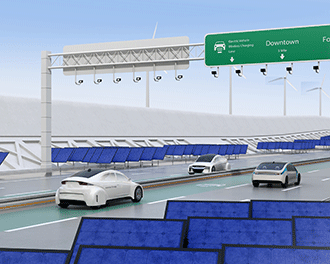
A non-contact charger that utilizes solar panels installed on the premises is buried in the ground of the base where the vehicle is parked, and the vehicle is constantly charged. In the future, by adopting this mechanism on public roads, energy-free EVs will be realized.
By the way, in the test drive, because it was a course that slowly went around the facility, I could not experience full-scale power performance such as acceleration, but Mr. Watanabe was also strongly attracted to the business model I heard at the office after that, and they are the ones who drive the car. I realized that it was a paradigm shift.
Car paradigm shift
There were two interesting points.
The first point is that in conventional car sharing, if the vehicle does not operate, it is simply parked, but in the case of "Slow life", the vehicle quickly changes to power storage that repeatedly sells and buys electricity when it is not operating. That's the point. The state of each vehicle at the bases that will be expanded nationwide in the future will be managed in the cloud, and if the price drops in the electricity sales market, a bid (buy) will be made, and if it becomes high, an offer (sell) will be made to automatically buy and sell electricity. On the other hand, it will also focus on the sustainable energy power generation equipment business such as solar power and wind power, and allocate the power to the car sharing business and the electricity trading business.

Second, all payments for service delivery are completed within the app. Users who use "Slow life" can register their credit card information in the "Slow life app" at the time of enrollment, and after using it, the charges including insurance premiums will be payment No complicated procedures or payment are required. revenue earned from buying and selling electricity exceed the upper limit set by "Slow life", points are automatically distributed to members as dividends. Of course, this point can be redeemed for 1 point = 1 yen, and if you link it with a transportation card, you can shop on your smartphone with the app and use public transportation.
The new way of interacting with these cars, the ease of understanding that the electricity bill in use is free, and the idea of buying and selling energy using cars and returning them to members make us feel a paradigm shift in cars. public entity such as cities and hospitals, convenience store chains, real estate companies that manage large condominiums, etc. in the event of a disaster or power outage. right.
* The content of the article posted on this site is a fiction that imagines the near future and creates hints for business in the near future. In addition, the copyright of articles and images in this content belongs to GMO Payment Gateway, Inc. The content of the article is an original idea of our company (GMO-PG), and if you would like to copy, reprint, or consult with us about the article or photo, please use the inquiry form.
Cooperation: JBpress
EV shift
The environment surrounding EVs (electric vehicles) is changing rapidly. In 10 states including California, the United States applies the "ZEV bill" that gives preferential treatment to automobile manufacturers for the sale of environment-friendly vehicles such as EVs, and conversely imposes sanctions on the sale of conventional vehicles such as gasoline vehicles. (From the "18 year model" sold at the end of 2017). China also requires manufacturers to produce and import a certain percentage of environmentally friendly vehicles such as EVs in order to improve air pollution. In addition, the United Kingdom and France announced that they will ban the sale of gasoline and diesel vehicles by 1940. All manufacturers are embarking on the development of environmentally friendly vehicles such as EVs.
Ideathon
A coined word for ideas and marathons. It is an event that continuously creates ideas, and is often the basis for ventures. There is a similar thing called "hackathon". While ideathons generate ideas, hackathons differ in that engineers gather to actually create software and prototypes.
Disruptor
Often translated as "destructive creator," it refers to companies and venture companies in different industries that bring innovative business models to the existing business environment and bring game changes to previous players. Recently, Uber Technologies and Airbnb are often said to be representatives.
Non-contact charger
Currently in Japan, the method of inserting the connector attached to the end of the cable into the EV body is adopted, but on the other hand, there is also a non-contact charging method that is relatively popular in mobile phones and the like. It is convenient to park the car in a designated place to start charging, but it has not become widespread due to the cost of burying the equipment and the standardization of equipment on the automobile side.
Iris recognition
One of the evolved biometrics. Humans have unique information that is more complicated and less likely to be imitated than fingerprints, and products that use palm veins and faces for authentication are widespread.
Introduction of recommended contents
- Top
- Column list
- Future Business Warehouse
- Does energy change when shifting to EV?

